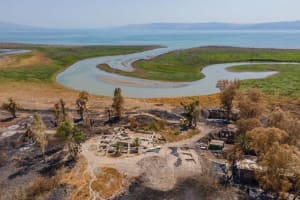Almost 60 Arab & Muslim states call to ‘review’ diplomatic & economic relations with Israel in Qatar summit
Crucially, summit doesn’t agree on practical measures against Jewish State

At the end of an “emergency summit” called by Qatar after Israel’s strikes against Hamas in its capital of Doha, nearly 60 Arab and Muslim countries signed a joint declaration expressing their support for Qatar.
The statement urged “all states to take all possible legal and effective measures to prevent Israel from continuing its actions against the Palestinian people,” including “reviewing diplomatic and economic relations with it, and initiating legal proceedings against it.”
In addition, the statement called on member states to “coordinate efforts aimed at suspending Israel’s membership in the United Nations.” However, the states did not commit to any practical or concrete measures or adopt a joint strategy for combating Israel at this time.
While Israel’s peace partners, the United Arab Emirates, Bahrain, Morocco, Jordan and Egypt all attended the summit, the summit statement did not explicitly pressure them to cancel or suspend their treaties with Israel.
The final statement of the Arab-Islamic emergency summit in Doha affirmed "absolute support" for Qatar and its security, stability, and sovereignty. While strongly worded, the 25-point statement falls short of including any concrete steps against Israel. pic.twitter.com/iMjz92N5vL
— Ariel Oseran أريئل أوسيران (@ariel_oseran) September 15, 2025
The summit was attended by leaders and senior officials of the member states of the Arab League and the Organization of Islamic Cooperation and discussed the Israeli strike in Qatar as well as the Gaza War and the ceasefire negotiations.
In addition to declaring their “full solidarity” with Qatar, the states also declared that Israel’s aggression was undermining chances of peace and accused it of trying to “impose a new reality in the region,” warning this would threaten not just regional but “international security.”
The leaders also called on the international community and the UN Security Council to pressure Israel to end its “occupation” of the West Bank.
“A just, comprehensive and lasting peace in the Middle East will not be achieved by bypassing the Palestinian cause or ignoring the rights of the Palestinian people, nor through violence or targeting mediators, but through commitment to the Arab Peace Initiative and relevant international legitimacy resolutions,” the statement read.
Saudi Crown Prince Mohammed bin Salman takes his place by the Emir of Qatar for the family photo ahead of the Arab-Islamic emergency summit in Doha.
— Ariel Oseran أريئل أوسيران (@ariel_oseran) September 15, 2025
pic.twitter.com/iFvEYCp0qY
The member states of the Abraham Accords (UAE, Bahrain and Morocco) which were signed exactly five years ago, didn’t send their leaders but were represented by senior officials.
The Heads of state and de-facto leaders present included Saudi Crown Prince Mohammed bin Salman, President Abdel Fattah al-Sisi of Egypt, Jordan's King Abdullah II, Iranian President Masoud Pezeshkian, Turkish President Recep Tayyip Erdogan, Syrian interim President Ahmed al-Sharaa, and Palestinian Authority President Mahmoud Abbas.
Al-Sisi warned that Israel’s attack in Qatar “places obstacles in the way of any opportunities for new peace agreements and even aborts the existing peace agreements with countries in the region”.
Pezeshkian and Erdogan stood out for making particularly harsh statements condemning Israel.
“Tomorrow, it could be the turn of any Arab or Islamic capital,” warned Pezeshkian, whose country fought a 12-day war with Israel in June.
“The choice is clear. We must unite… no Arab or Islamic country is safe from the attacks of the Zionist regime [Israel] and we have no choice but to unite our ranks,” he said.
Only months after Iran itself attacked Qatar with ballistic missiles, the Iranian Foreign Minister Abbas Araghchi has arrived in the Qatari capital of Doha for a summit of Arab leaders protesting the recent ballistic missile strike by Israel against Hamas leadership in Qatar. pic.twitter.com/O5K6KPzFB2
— OSINTdefender (@sentdefender) September 15, 2025
Iran attacked Qatar with several missiles in June, in response to the U.S. strikes on its nuclear sites. No regional summit was held following these strikes.
Turkish President Erdogan accused Israel of having a “terrorist mentality,” and said the attack on the Hamas delegation in Doha had taken “Israel’s banditry” to a different level.
“We are facing a terrorist mentality that feeds on chaos and blood, and a state that embodies it,” he said. “This mentality survives only because its crimes go unpunished. Genocidal Israel must be stopped. Israel will not stop without sanctions,” he said, also calling for economic sanctions.
On the sidelines of the larger summit, the six members of the Gulf Cooperation Council (GCC) also convened.
Its Secretary General Jasem Mohamed Al-Budaiwi told a press conference, “We also expect our strategic partners in the United States to use their influence on Israel in order for it to stop this behaviour,” he said.
“They have leverage and influence on Israel, and it’s about time that this leverage and influence be used.”
The GCC also stated that its unified military council will be instructed “to take the necessary executive measures to activate joint defence mechanisms and Gulf deterrent capabilities”.
The Joint Defence Council has only been activated twice before, once in 1991 against Iraq and again in 2011 during the Arab Spring.
On Tuesday, U.S. Secretary of State Marco Rubio is set to arrive in Qatar, a day after visiting Israel and reiterating the Trump administration’s support for the country (Israel).

The All Israel News Staff is a team of journalists in Israel.
You might also like to read this:

















